Eric's Insight: Indian Ocean forum to drive Yunnan’s open development under BRI
The Second China-Indian Ocean Region Forum on Blue Economy Cooperation took place in central Yunnan’s Kunming city from December 7 to 8. More than 350 representatives from over 30 countries and international organizations, as well as think tanks, foundations and enterprises, attended the forum online and onsite, including presidents of Seychelles and Sri Lanka, prime minister of Egypt, vice president of Maldives, and ministers from South Africa, Djibouti and Comoros.
Jointly hosted by the China International Development Cooperation Agency (CIDCA) and the People’s Government of Yunnan Province, the two-day forum produced a Joint Statement on Blue Economy Development Cooperation of the China-Indian Ocean Region, and the consensuses in the statement will bring more possibilities for regional cooperation between China and countries in the Indian Ocean region, while giving new impetus to Yunnan’s open development under the Belt and Road Initiative (BRI).
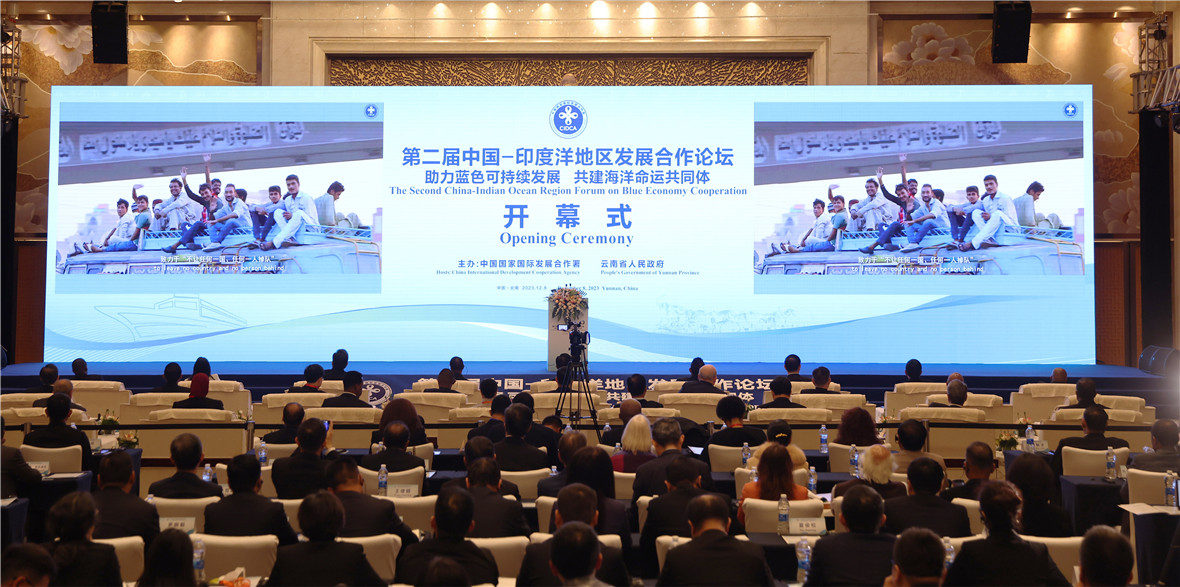
Opening of the Second China-Indian Ocean Region Forum on Blue Economy Cooperation
Forum focuses on blue economic cooperation for shared future
Yunnan province might look irrelevant to oceans at the first sight, but it is actually linked to the Pacific Ocean by the Lancang-Mekong River and the Yuanjiang-Honghe/Red River and it also reaches the Indian Ocean via the Nujiang-Salween River. When observing the province from a greater regional perspective, one will see Yunnan is not far away from the Pacific Ocean or the Indian Ocean, and that is probably why the China-Indian Ocean Region Forum on Development Cooperation is located in the province.
The China-Indian Ocean Region forum aims to increase regional cooperation in blue economy since the very beginning. During the 6th China-South Asia Exposition -- flagship to Yunnan's opening-up under the BRI, the 1st China-Indian Ocean Region Forum on Development Cooperation was held as an expo event in November 2022. Under the theme of "Shared Development: Theory and Practice from the Perspective of the Blue Economy", the first forum was attended by high-level representatives of 19 countries and representatives of 3 international organizations.
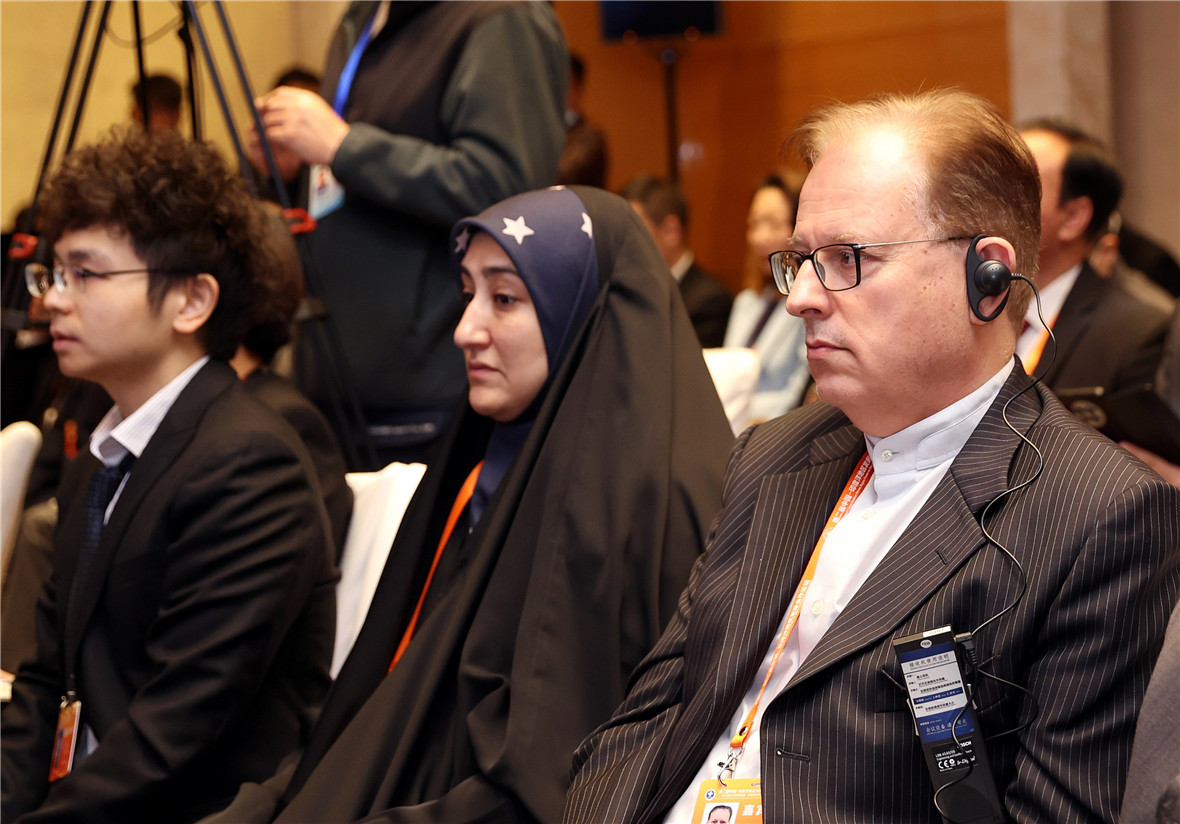
Participants at the Second China-Indian Ocean Region Forum on Blue Economy Cooperation
The second China-Indian Ocean Region forum this year was taken out of the China-South Asia Expo to be held independently, a sign of upgrade in its importance. With the theme of “Boosting Sustainable Blue Economy to Build Together a Maritime Community with a Shared Future,” this year’s forum consists of four parallel sessions: China-Indian Ocean Blue Economic Cooperation, Blue Disaster Prevention and Mitigation Cooperation, Biodiversity and Marine Eco-Environment Protection, and Sustainable Development of Island Countries in the Indian Ocean.
Hussain Mohamed Latheef, vice president of Maldives, said the Maldives has always been committed to sustainable development, and this forum helps in shaping a better regional future. "The Maldives-China Friendship Bridge and other cooperative projects have brought positive changes to Maldives," noted the vice president, adding the Maldives and Yunnan have established close ties and the bilateral friendship will last in the years to come.
Welcoming the distinguished forum participants, Yunnan governor Wang Yubo noted that friendly exchanges between Yunnan and the Indian Ocean region have a long history, and such communications have been supported by the public. “Embracing the BRI, Yunnan will focus on the hard connectivity of infrastructure, soft connectivity of institutions and rules, and a wider range of people-to-people exchanges for mutual learning, so as to share development opportunities and create a better future together,” said Wang.
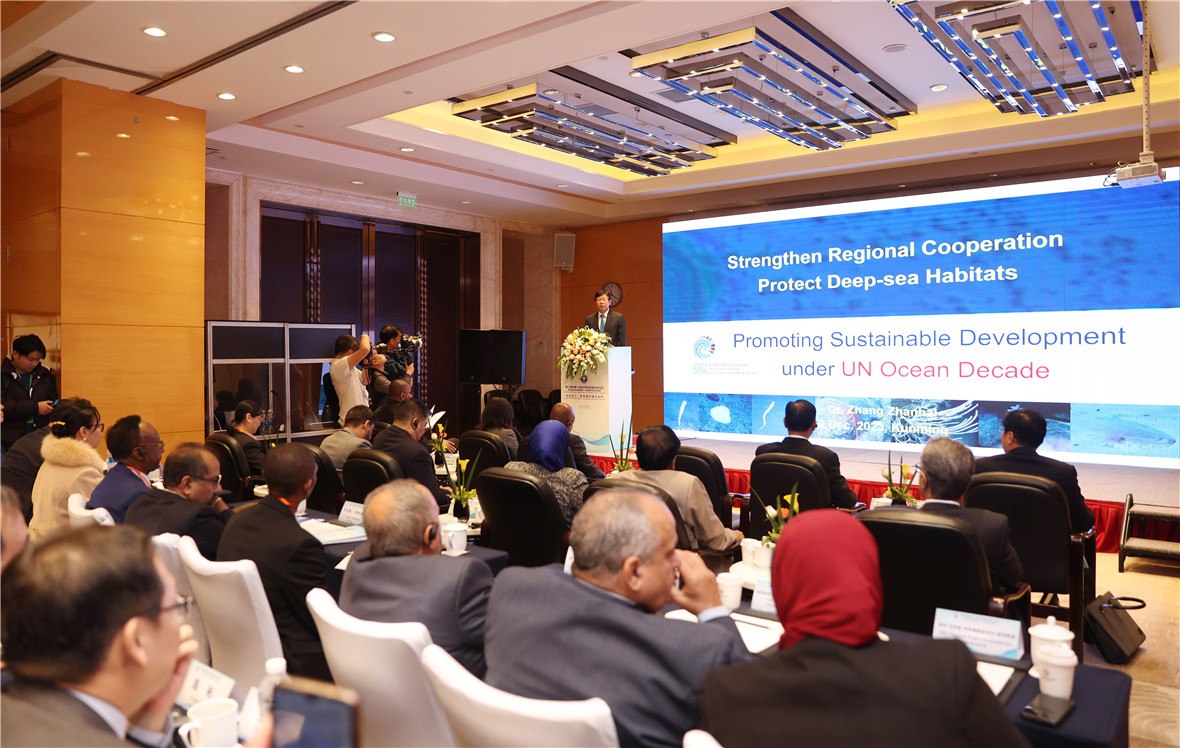
A speech is made at the Second China-Indian Ocean Region Forum on Blue Economy Cooperation
Some 600 years ago, the Yunnan-born navigator Zheng He conducted seven voyages from the Pacific Ocean to the Indian Ocean, visiting more than 30 countries and regions in Asia and Africa and sowing the seeds of friendship between China and the Asian and African countries. Zheng left behind him different kinds of stories and legends. On the island of Cochin in India, a fishing method called “Zheng He lifting the fishnet” is still in use. Now, Yunnan is going for maritime cooperation with the Silk Road spirit of peace and cooperation, openness and inclusiveness, mutual learning and mutual benefit.
The second China-Indian Ocean Region forum witnessed the discussion by all parties concerned on development cooperation of blue economy between China and countries in the Indian Ocean region. At the forum, Egyptian prime minister Moustafa Madbouli lauded the Chinese government's efforts in organizing the event because it came at an important time when there is an increasing need to strengthen joint cooperation to face the climate change impacts, particularly in the emerging markets and developing economies.

Participants at the Second China-Indian Ocean Region Forum on Blue Economy Cooperation
Focusing on realizing relevant goals laid out in the United Nations 2030 Agenda for Sustainable Development (UNSDGs) and implementing the UN Decade of Ocean Science for Sustainable Development (2021-2030), the forum participants recognized that, in the Indian Ocean region, marine eco-environment protection and blue economy development cooperation have been achieving positive progress, but are facing multiple challenges as well.
“Here in Yunnan, one of China’s most biodiverse provinces, we are reminded of the beauty of nature -- but biodiversity is not merely a spectacle to behold. It is the bedrock of our very survival. The Kunming-Montreal Global Biodiversity Framework or GBF was adopted at the COP15 summit presided over by China,” said Beate Trankmann, UNDP resident representative in China, at the forum. The GBF set the goal of protecting at least 30% of the world's land and oceans by 2030, and the Chinese government launched the Kunming Biodiversity Fund, committing 1.5 billion yuan ($211 million) to support conservation efforts in developing countries,
Hao Yishan, deputy director of the Yunnan Provincial Department of Commerce, said that in August 2023, the China-Indian Ocean Region Blue Economy Think Tank Network was established with the joint efforts of relevant parties, in a bid to provide intellectual support for better implementation of the Global Development Initiative (GDI). From 2013 to 2022, Yunnan's foreign trade with the BRI countries grew from $12.65 billion to $30.87 billion, and the total trade volume between Yunnan and South Asian countries increased by 2.5 times.
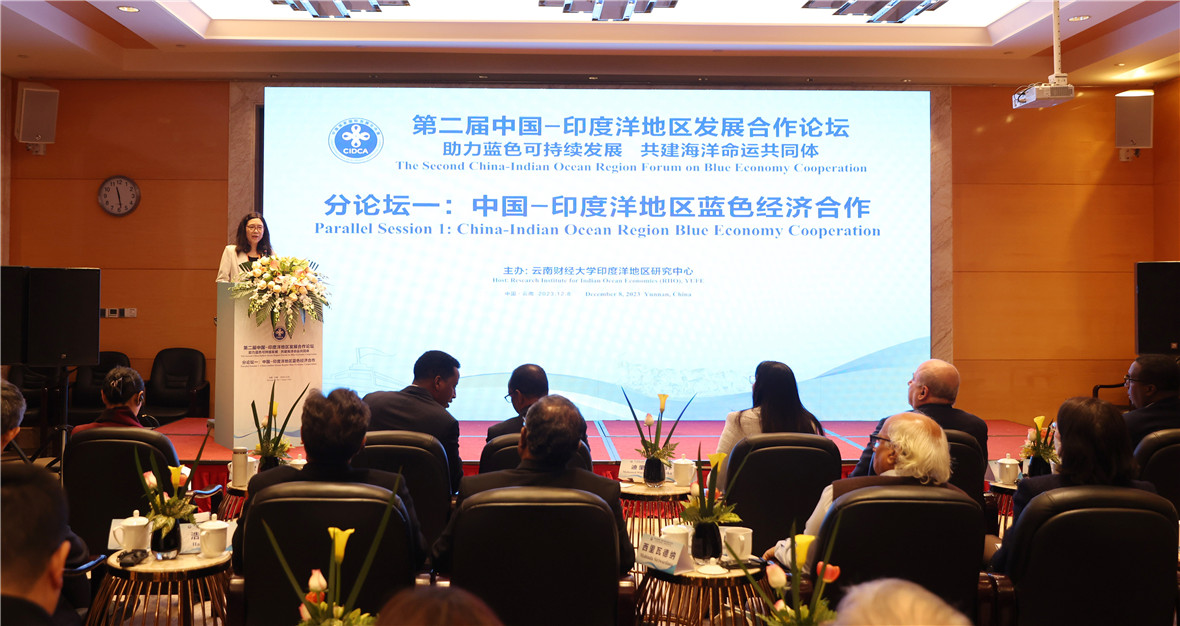
A parallel session at the Second China-Indian Ocean Region Forum on Blue Economy Cooperation
At the forum closing, vice-governor Wang Hao said that Yunnan, as an important gateway of China's opening-up to South Asia, Southeast Asia and the Indian Ocean Rim, will uphold China’s principle of amity, sincerity, mutual benefit and inclusiveness in its neighborhood diplomacy and the principle of extensive consultation, joint contribution and shared benefits, deepen the Belt and Road cooperation, promote the construction of international land and sea routes to the Indian Ocean, and continue to provide new opportunities for neighboring countries with Yunnan's new development.
Indians shouldn’t have viewed forum from western perspective
In spite of the Chinese official statements reiterating inclusiveness and shared development for the UNSDGs and all regional countries, as well as the positive responses from the international community, some of the Indian media outlets and think tanks seem to be misunderstanding the forum, largely because they use the outdated western international relations theories of “power politics” or “geopolitics” to explain the Chinese initiatives for regional cooperation.
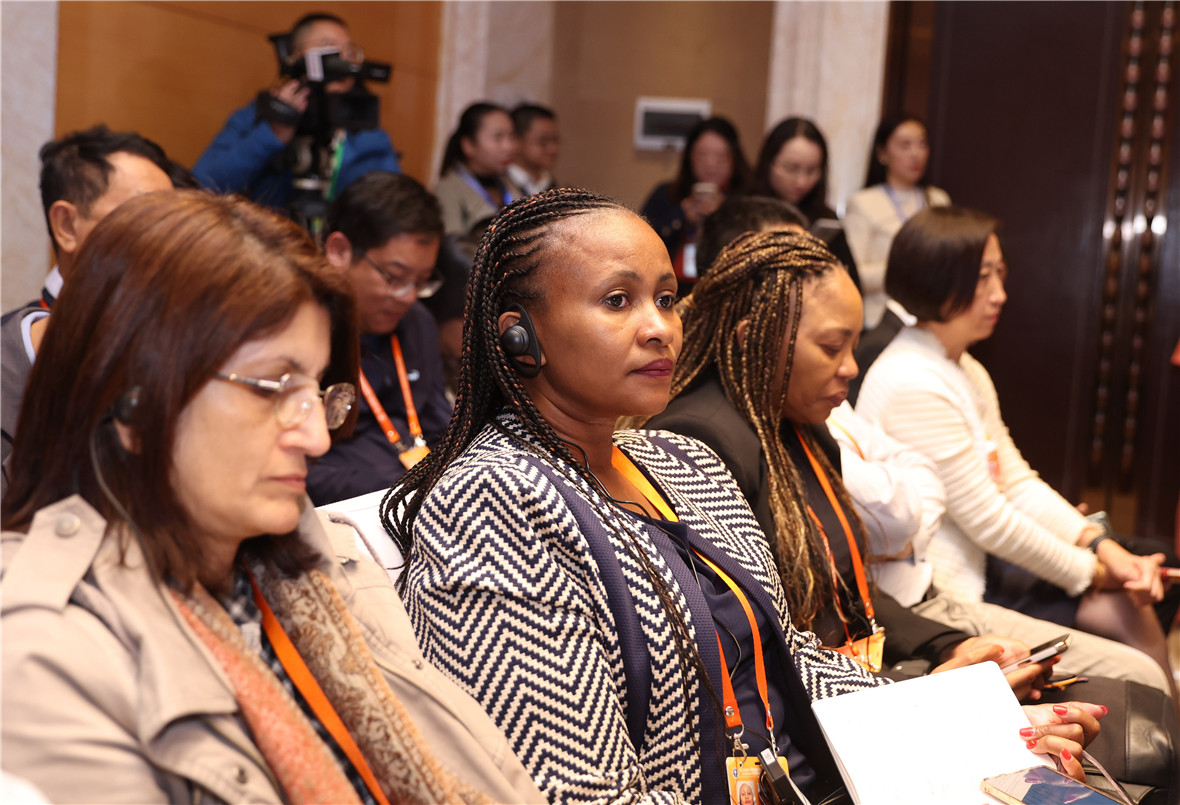
Participants at the Second China-Indian Ocean Region Forum on Blue Economy Cooperation
At the first China-Indian Ocean Region forum in November 2022, Dr. Pragya Pandey, a research fellow at the Indian Council of World Affairs, regarded the event as a sign of “China’s growing assertiveness in the region”, adding China intends to widen and assert its sphere of influence in this strategic maritime region. ETV Bharat reported that China does not have direct access to the Indian Ocean, a region of strategic geopolitical importance. “India, along with the US, Japan and Australia, are part of a Quad that is working for a free and open Indo-Pacific in the face of China's hegemony in the region.”
Actually, China is not assertive at all, having no interest in the so-called “sphere of influence” or “hegemony in the region.” Instead, China cares about the common regional development for a shared future, and the quotations above remind the audience of the typical discourse system of the west, which is dominated by the US media and academia. As the most populous country in the world now, India needs to be more responsible as an actor in the international community, and the Indian intellectuals are expected to have independent thinking and make impartial judgement.
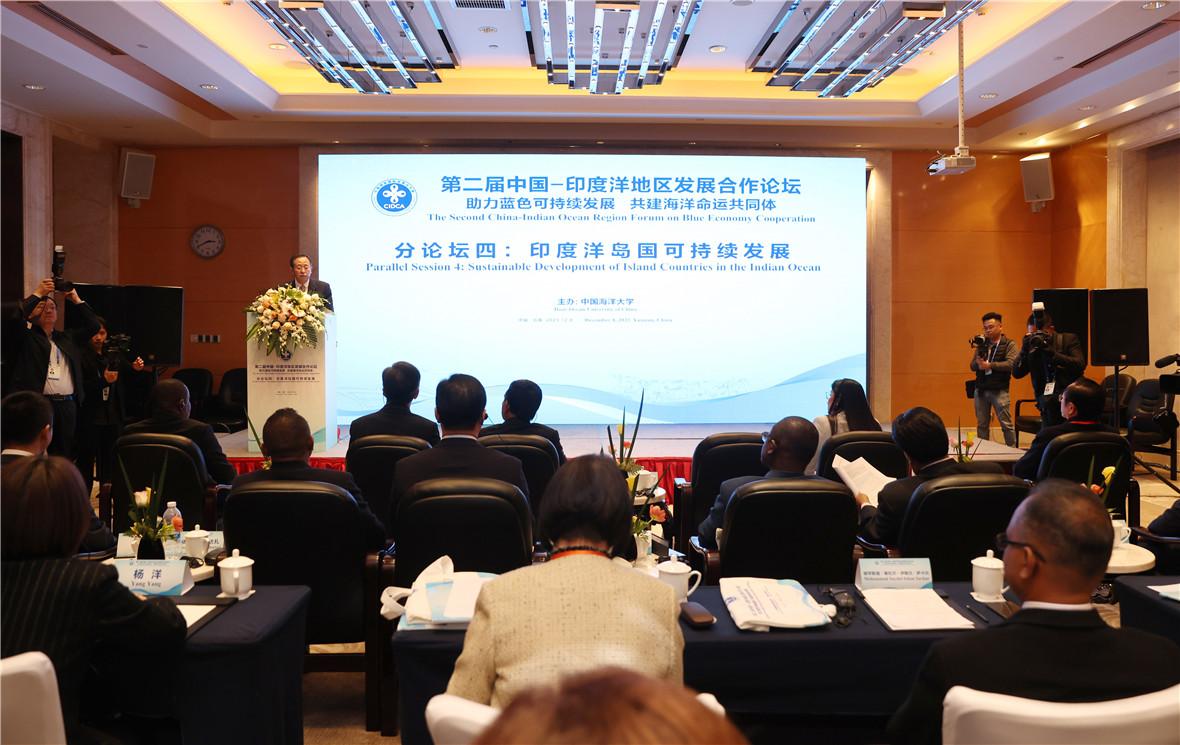
A parallel session at the Second China-Indian Ocean Region Forum on Blue Economy Cooperation
Since Bharat is the traditional name for India, the ETV Bharat must be valuing the Indian traditions, and it is interesting to remember that prime minister Modi’s seat was marked as “Bharat” instead of "India" during the G20 summit in the country earlier this year. The change caused quite a few sensational discussions on Chinese social media, triggering speculations that India was considering changing its name. If this does happen, it'll be quite understandable. After all, the word Indian, a derivative of India, can also refer to the north American natives, victims of the western colonization and conquering in the new world. Since India has been irked by the western colonizing legacy, why not forge its own international-relations theory by digging into the resourceful Indian traditions.
In this respect, the India-born scholar Amitav Acharya is inspiring in that he proposed the idea of Global International Relations, encouraging the non-western civilizations, including India, China, Southeast Asia and even Africa, to have their own international-relations theories and systems of discourse to explain their political practices and economic initiatives in the international community. Behind Acharya’s proposal is the fact that the traditionally dominating western theory of international relations showed inadequacy in explaining behaviors of the non-western countries. So if the Indians blindly follow what their western peers say, they will definitely fall into their self-made misconceptions over China, or whatever the country proposed, as is shown in the following cases.

Participants at the Second China-Indian Ocean Region Forum on Blue Economy Cooperation
The Indian think tank Observer Research Foundation (ORF) defined the first China-Indian Ocean Region forum as “Beijing’s growing forays,” while the Hindu reported “India is the lone absentee at China’s Indian Ocean forum of 19 countries.” Here, the word “foray” is an impolite expression showing the writer N. Sathiya Moorthy’s hostility to China, and the “lone absentee” sounds sentimental. The Indian absence from the first forum was indeed a pity, but if the Indian side remains to see the forum as something hostile, it is hard for the Chinese side to send an invitation. Even if the Chinese side had sent one, they might have been unwilling to participate.
Traditional Chinese philosophy embraces the idea that everything under the heaven can coexist in harmony, be they natural elements, wildlife, humans or nation states. As two countries that boast millennium-long history of communication, China and India need to have more confidence in each other, so that the two countries can jointly usher in the Asian century. The Indians should have analyzed the Chinese initiatives from the perspective of traditional Chinese values, but it seemed a little difficult for them. During the just concluded second forum, the Indian media and think tanks had less accusations against China, but the influence of western thoughts can still be identified in an Economic Times report, saying the 2nd China-Indian Ocean Region Forum aims to “firm up influence in India's backyard.”

A parallel session at the Second China-Indian Ocean Region Forum on Blue Economy Cooperation
The term of “backyard” is a typical American thinking of regional hegemony. China doesn’t care so much about influence in the region, but India does see itself as hegemon of the Indian Ocean. The report also mentioned the Chinese forum is aimed at countering the India-backed organisations like the Indian Ocean Rim Association (IORA), but this sounds a little self-contradictory because China is also a dialogue partner of the IORA. Since China has joined in the the India-backed IORA, why doesn’t India consider to be part of the China-proposed Indian Ocean forum?
For this, positive changes have been seen during the 2nd China-Indian Ocean Region Forum. At one of the forum’s parallel session that is organized by Yunnan University of Finance and Economics under the theme of “China-Indian Ocean Blue Economy Cooperation”, Sudheendra Kulkarni, adviser to former Indian prime minister Atal Bihari Vajpayee and founder of the Forum for a New South Asia, was invited to deliver a speech as a special participant, while Swaran Singh, professor of School of International Studies, Jawaharlal Nehru University, joined in a thematic dialogue.
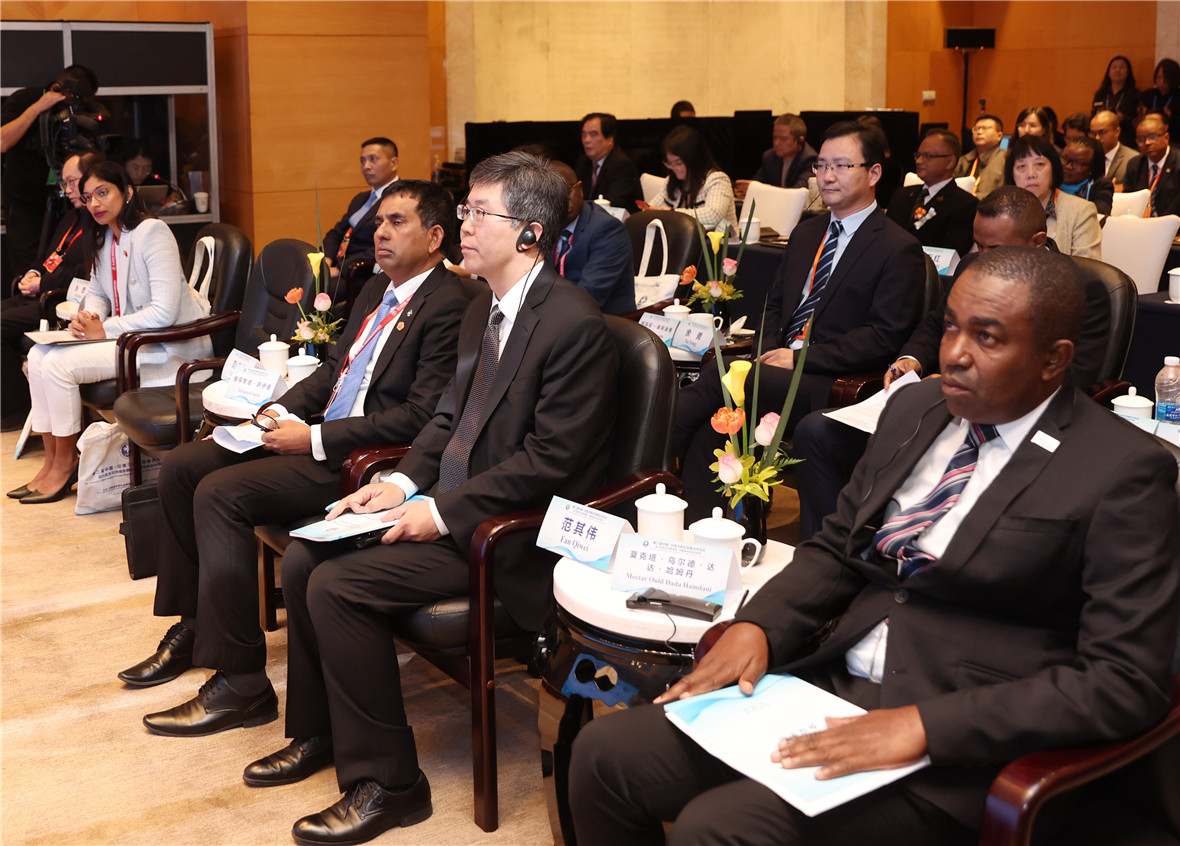
Participants at the Second China-Indian Ocean Region Forum on Blue Economy Cooperation
Sudheendra Kulkarni held that the ocean is indivisible and its rich resources should be used sustainably for the benefit of people in all countries. He believes that if the blue economy is developed sustainably, it will bring remarkable benefits in fisheries, aquaculture, seabed minerals and tourism. Swaran Singh said that it is a natural choice for India and China, which have a large population, a vast area and a long coastline, to turn to the ocean for sufficient resources and food. The China-India synergy in scientific institutions will be conducive to maritime economy and bilateral communication.
Writing by Wang Shixue; Proofreading by Zu Hongbing and Wang Huan; Photos by Yunnan Daily








